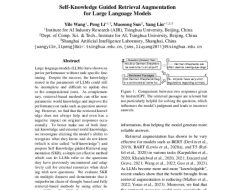Unlocking the Power of Internal Dialogue with Large Language Models
Internal dialogue, the constant stream of thoughts running through our minds, is an integral part of human cognition. It helps us process our experiences, plan actions, and reflect on our feelings. However, the complexity of this inner discourse has made it a challenge to decipher and understand. Enter the field of artificial intelligence (AI), particularly the Large Language Models (LLMs), which are enhancing our understanding of this internal dialogue.
From Language Models to Large Language Models
The evolution of language models to LLMs has been marked by several key improvements and challenges. The journey began with rule-based models, which were limited in their ability to grasp the nuances of human language. As the field of AI matured, data availability and advances in computational power led to the development of more sophisticated models. Transfer learning and pretraining became vital components in improving these models, while regularization and pruning techniques helped mitigate overfitting and generalization issues. These advancements paved the way for LLMs, capable of understanding and generating human-like text.
LLMs and Understanding of Human Cognition
LLMs like GPT-3 have shown impressive capabilities in generating human-like responses and carrying on conversations. They can understand context, making them ideal for analyzing the nature of human thought processes and internal dialogue. This unveils a new perspective on human cognition, as these models can mirror our thought processes and provide valuable insights into how our minds work.
The Impact of LLMs on Various Industries
The potential impact of LLMs extends beyond the realm of psychology and cognitive science. They can revolutionize various industries, including healthcare, education, and customer service, among others. For instance, LLMs can be used to develop mental health applications that can understand and respond to user inputs in a meaningful way, providing emotional support and even therapeutic interventions.
Ethical and Psychological Considerations
While the potential of LLMs is immense, it also raises important ethical and psychological considerations. Ensuring the interpretability and explainability of these models is crucial to prevent misuse and misinterpretation of their outputs. Furthermore, there are concerns about the potential for bias in these models, as they learn from data that may reflect societal biases. Addressing these concerns while advancing the capabilities of LLMs is a key challenge for the future.
Looking Ahead
The journey of language models to LLMs has been transformative, but it is far from over. The future will likely see efforts to develop more explainable and interpretable models, reduce computational costs, and address the ethical concerns associated with LLM usage. As we continue to unravel the potential of these models to understand human cognition and internal dialogue, the implications for our understanding of the human mind are profound.




